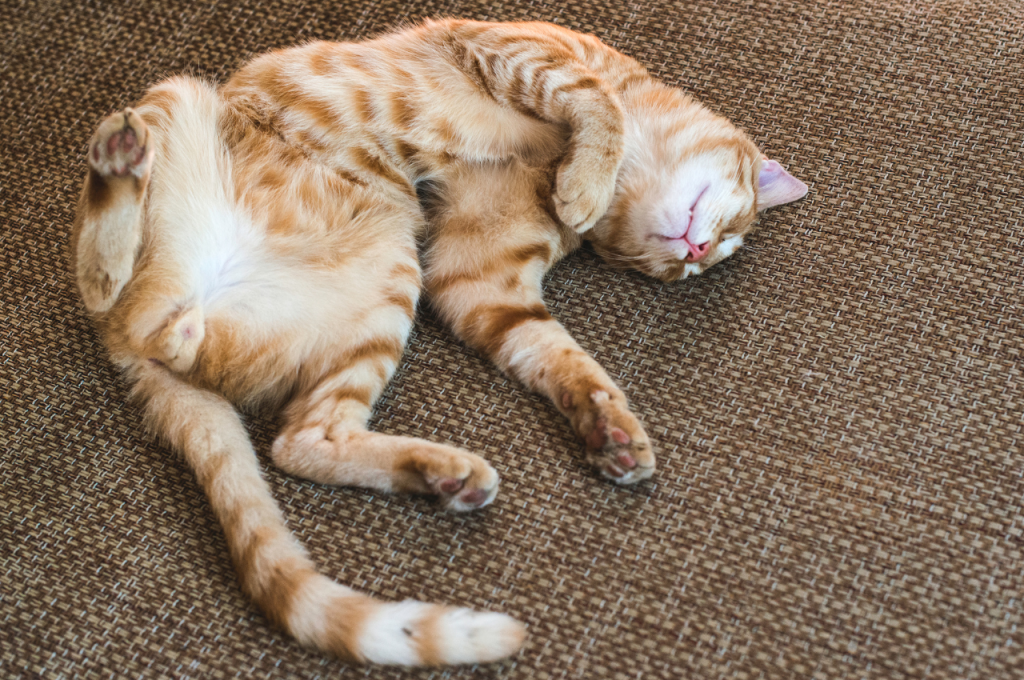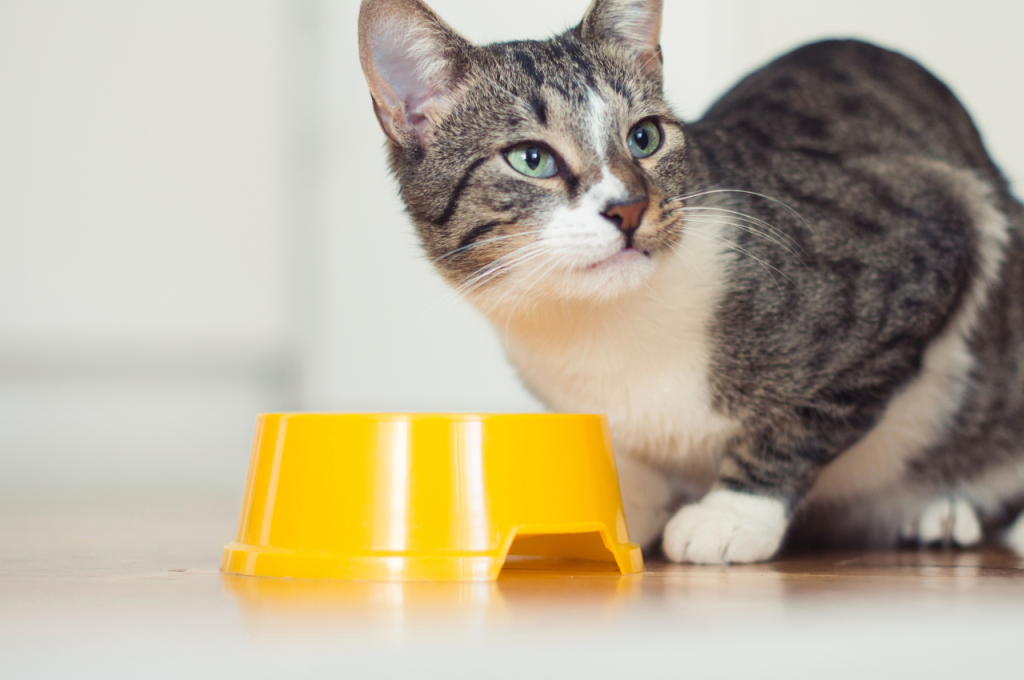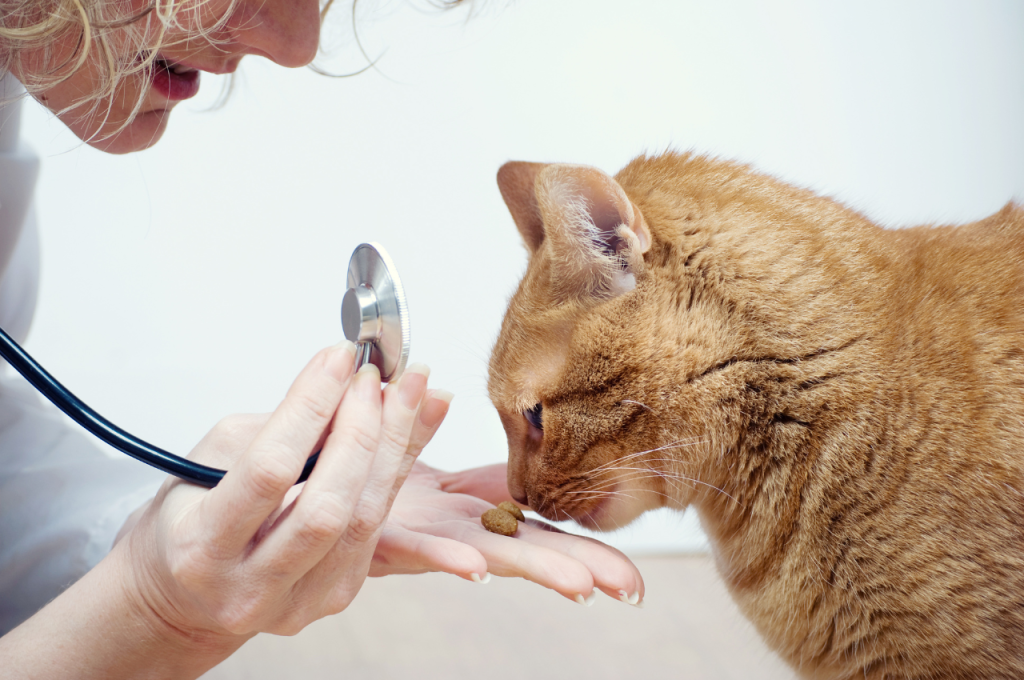To change a cat’s sleeping habits, create a consistent routine and engage in interactive play sessions. Providing stimulating toys and a comfortable sleeping area can also encourage better sleep patterns.
Additionally, consider adjusting feeding times to align with your cat’s natural sleep-wake cycle. By establishing a structured environment and ensuring adequate mental and physical stimulation, you can help regulate your cat’s sleep behavior effectively. In this blog post, we will explore practical strategies to modify your cat’s sleeping habits and promote a healthier sleep schedule.
Let’s delve into the fascinating world of feline sleep patterns and discover ways to optimize your cat’s rest and well-being.
The Cat’s Natural Sleep Cycle
Cats are crepuscular animals, meaning they are most active during dawn and dusk. Their natural sleep cycle includes multiple short naps throughout the day and night, totaling around 12-16 hours of sleep. This behavior is rooted in their evolutionary past as hunters, where conserving energy during inactive periods helped them remain alert for hunting at twilight. Understanding this natural rhythm can help in creating a comfortable environment that aligns with their sleep patterns, ensuring they get the rest they need while minimizing disruptions in their sleep cycle.

Feline Sleep Patterns
Feline sleep patterns are unique and tailored to their natural instincts as predators. Cats typically sleep between 12 to 16 hours a day, with their rest divided into multiple naps. They are crepuscular, meaning they are most active during dawn and dusk. This behavior stems from their evolutionary role as hunters, where conserving energy during the day and night helped them remain alert and agile. During their sleep, cats may experience REM cycles, which are essential for their overall health and well-being. Understanding these patterns helps cat owners create environments that support their feline friends’ natural behaviors and sleep needs.
Circadian Rhythms in Cats
Cats have an internal clock that regulates their sleep-wake cycle based on light and darkness.
Reasons for Altering Sleep Habits
Changing a cat’s sleeping habits can be a challenge, but it’s necessary for various reasons. Altering sleep habits can improve a cat’s health, prevent destructive behavior, and promote better sleep for both the cat and their owner.
Changing a cat’s sleeping habits can be necessary for various reasons. These reasons can be broadly categorized into behavioral issues and health concerns. By addressing these underlying factors, you can help your cat establish healthier sleep patterns.
Behavioral Issues
Cats, like humans, can develop certain behavioral issues that affect their sleep habits. These issues may include anxiety, stress, or even boredom. Cats are known to be highly sensitive creatures, and any changes in their environment or routine can disrupt their sleep patterns.
Here are some common behavioral issues that may require altering a cat’s sleep habits:
- Separation anxiety: Cats that experience separation anxiety may have difficulty sleeping when their owners are away. They may exhibit signs of restlessness, meowing excessively, or even engaging in destructive behavior.
- Noise sensitivity: Cats can be sensitive to loud noises, which can disrupt their sleep. Fireworks, thunderstorms, or even household noises can cause anxiety and prevent them from getting adequate rest.
- Environmental changes: Moving to a new home or rearranging furniture can affect a cat’s sense of security and comfort. This can lead to sleep disturbances as they adjust to the new surroundings.
- Lack of stimulation: Cats that do not have enough mental and physical stimulation during the day may become restless at night. They may engage in excessive play, leading to interrupted sleep patterns.
Health Concerns
Just like humans, cats can experience health issues that impact their sleep. It is essential to address these concerns to ensure your cat’s well-being and promote better sleep.
Here are some health concerns that may require altering a cat’s sleep habits:
- Pain or discomfort: Cats in pain or discomfort may find it challenging to sleep peacefully. This could be due to conditions such as arthritis, dental problems, or digestive issues.
- Medical conditions: Certain medical conditions, such as hyperthyroidism or kidney disease, can disrupt a cat’s sleep patterns. It is important to consult with a veterinarian to diagnose and treat any underlying health issues.
- Aging: As cats age, they may experience changes in their sleep patterns. They may sleep more during the day and become restless at night, which can be attributed to age-related conditions or cognitive decline.
- Obesity: Cats that are overweight or obese may have difficulty finding a comfortable sleeping position. Obesity can also lead to sleep apnea or other respiratory problems, further affecting their sleep quality.
By addressing these behavioral and health-related issues, you can help your cat establish healthier sleep habits. Consult with your veterinarian to determine the best course of action and provide your feline friend with the care they need for a good night’s sleep.
Assessing Your Cat’s Environment
Assessing your cat’s environment is crucial when it comes to changing their sleeping habits. Cats are sensitive to their surroundings, so creating a comfortable sleep area and minimizing nocturnal distractions are essential for promoting better sleep patterns.
Comfortable Sleep Areas
Ensure that your cat has a cozy and comfortable sleeping area. This could include a soft bed or blanket in a quiet and secluded spot. Provide multiple sleep options to see what your cat prefers.
Nocturnal Distractions
Minimize nocturnal distractions that could disrupt your cat’s sleep. This may involve reducing noise, blocking out bright lights, and creating a calming environment during the night.
Diet and Nutrition’s Role in Sleep
Improve your cat’s sleep with a balanced diet rich in nutrients like tryptophan and magnesium. Incorporate wet food to keep them hydrated for a good night’s rest. Establish a consistent feeding schedule to regulate their sleep cycle naturally.

Meal Timing
Meal timing plays a crucial role in regulating a cat’s sleep patterns. By establishing a consistent feeding schedule, you can help your feline friend develop a routine and adjust their sleep accordingly.
When it comes to meal timing, it’s important to feed your cat at the same time every day. This will help synchronize their internal clock and promote healthy sleep habits. Avoid leaving food out all day, as free-feeding can disrupt their sleep-wake cycle.
Dividing their daily portion into smaller meals throughout the day can also be beneficial. This mimics their natural hunting behavior and keeps them satisfied without overeating. Consider using an automatic feeder to ensure they receive their meals at consistent intervals, even when you’re not home.
Foods That Promote Sleep
Just like humans, certain foods can help cats relax and fall asleep more easily. Including these sleep-promoting foods in your cat’s diet can contribute to a better night’s rest:
- Fish: Rich in omega-3 fatty acids, fish is known to have a calming effect on cats. Including fish such as salmon or tuna in their diet can help promote better sleep.
- Poultry: Chicken or turkey are excellent sources of tryptophan, an amino acid that aids in the production of serotonin and melatonin, hormones that regulate sleep.
- Pumpkin: This fiber-rich vegetable is not only beneficial for digestion but also contains magnesium, a mineral that helps cats relax and unwind.
When introducing new foods to your cat’s diet, it’s important to do so gradually to avoid any digestive upset. Start by incorporating small amounts and monitor their response.
In conclusion, by paying attention to your cat’s diet and nutrition, you can positively influence their sleep habits. Establishing a consistent meal timing and including sleep-promoting foods can contribute to a better night’s rest for your feline companion.
Interactive Play and Exercise
Looking to change your cat’s sleeping habits? Try incorporating interactive play and exercise into their daily routine. Engaging your cat in playtime activities can help stimulate their mind, promote physical activity, and redirect their sleeping patterns. By providing interactive toys and dedicating regular play sessions, you can encourage your cat to be more active during the day and improve their sleep habits naturally.
Daytime Activities
Interactive play and exercise are crucial for altering a cat’s sleeping habits. Engaging your feline friend in daytime activities can help expend their energy and promote a more active lifestyle.
Toys and Puzzles
Providing toys and puzzles can stimulate your cat mentally and physically. Interactive toys encourage play and help keep them entertained during the day. Encourage your cat to play by using toys such as feather wands, laser pointers, and puzzle feeders. Rotate toys regularly to keep them interested. Incorporate play sessions into your daily routine to help keep your cat active and engaged. Set aside time each day for interactive play to help curb excessive sleeping behavior.
Establishing a Routine
If you’re a cat owner, you know that cats are creatures of habit. They love routine and can be very set in their ways, especially when it comes to sleeping habits. However, sometimes you may need to change your cat’s sleeping habits, whether it’s because they’re keeping you up at night or because you want them to be more active during the day. One of the best ways to do this is by establishing a routine.
Consistent Schedules
Cats thrive on routine, so it’s important to establish a consistent schedule for your cat’s sleeping habits. This means feeding them at the same time every day, playing with them at the same time, and putting them to bed at the same time. By doing this, your cat will learn when it’s time to sleep and when it’s time to be active, which can help them adjust their sleeping habits.
Training Techniques
In addition to establishing a routine, there are a few training techniques you can use to change your cat’s sleeping habits. One technique is to play with your cat more during the day. This will help them burn off excess energy and be more tired at night. Another technique is to provide your cat with a comfortable sleeping area away from your bedroom. This will help them associate that area with sleep and not with playtime.
Establishing a routine is one of the best ways to change your cat’s sleeping habits. By providing your cat with a consistent schedule and using training techniques, you can help your cat adjust to a new sleeping routine. Remember to be patient and persistent, as changing your cat’s habits may take some time. With a little effort, however, you can help your cat get the rest they need and create a more peaceful sleeping environment for yourself.
Creating a Calming Atmosphere at Night
Creating a calming atmosphere at night is essential for changing your cat’s sleeping habits. Reducing stress, providing comfort items, and creating a soothing environment can help your feline friend feel more relaxed and ready for a good night’s sleep.
Reducing Stress
Reducing stress in your cat’s environment is crucial for promoting a calming atmosphere at night. Ensuring that your cat has a quiet and peaceful space to rest can significantly reduce their stress levels. Additionally, keeping their routine consistent and minimizing exposure to loud noises can also help in reducing stress.
Comfort Items
Comfort items such as cozy beds, soft blankets, and favorite toys can contribute to a calming atmosphere at night. Providing these items in your cat’s sleeping area can make them feel more secure and comfortable. Furthermore, incorporating calming scents, such as lavender, can also help create a soothing environment for your cat.
When to Consult a Veterinarian
To improve a cat’s sleeping habits, it’s essential to consult a veterinarian for guidance. Changes in a cat’s sleeping patterns could indicate underlying health issues, so seeking professional advice is crucial for their well-being. Veterinary input can help address any concerns and provide tailored solutions for improving a cat’s sleep.

Persistent Sleep Issues
If your cat continues to experience sleep issues despite your efforts to change its sleeping habits, it may be time to consider seeking professional help. Persistent sleep issues could indicate underlying health problems or behavioral issues that require expert intervention. In such cases, consulting a veterinarian is crucial to identify the root cause and develop an effective solution.
Medical Interventions
When attempting to change your cat’s sleeping habits, sometimes medical interventions may be necessary. Your veterinarian can assess your cat’s overall health and recommend appropriate treatments or medications to address any underlying medical conditions that could be affecting its sleep patterns. Medical interventions may include prescription medications, dietary changes, or specialized therapies to help regulate your cat’s sleep.
Frequently Asked Questions
Here are some commonly asked questions about how to change a cat’s sleeping habits:
How to Adjust a Cat’s Sleeping Schedule?
To adjust a cat’s sleeping schedule, gradually change their feeding and playtime routines. Encourage physical activity during the day and provide interactive toys. Create a cozy sleeping area away from distractions. Stick to a consistent bedtime routine and avoid stimulating activities before bed.
How Do i Stop a Cat Waking Me up at 4am?
To prevent a cat from waking you at 4am, establish a consistent feeding schedule, play with them before bed, and ignore their early morning demands.
How Do i Get My Cat to Sleep at Night?
To help your cat sleep at night, establish a routine of playtime and feeding during the day to tire them out. Provide a comfortable sleeping area and avoid feeding them right before bedtime. Keep them active during the day and avoid sudden noises or movements at night to prevent disturbance.
How Do i Stop My Cat From Having Night Crazies?
To stop your cat from having night crazies, provide interactive playtime during the day. Avoid feeding late at night, and create a calming bedtime routine. Use toys to engage your cat’s hunting instincts and provide a comfortable sleeping area.
Conclusion
Incorporating the right strategies can help shift your cat’s sleeping habits over time. By understanding their natural behaviors and providing a comfortable environment, you can encourage healthier sleep patterns. Remember to be patient and consistent in implementing changes, and seek advice from a veterinarian if necessary.
